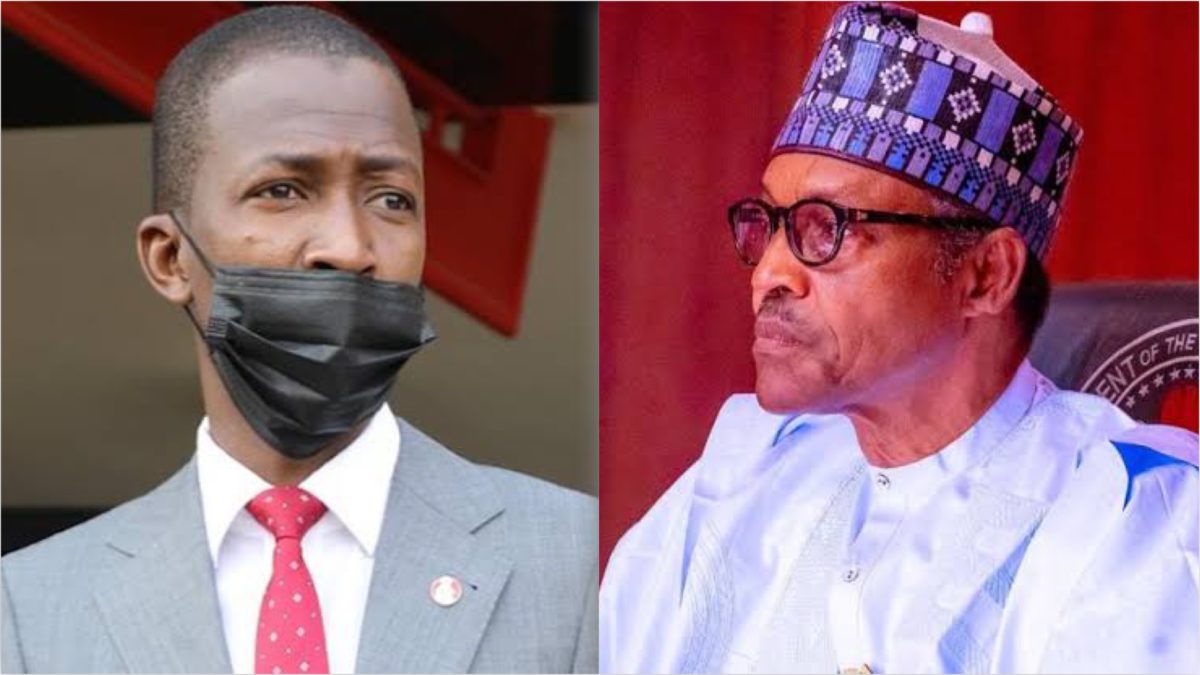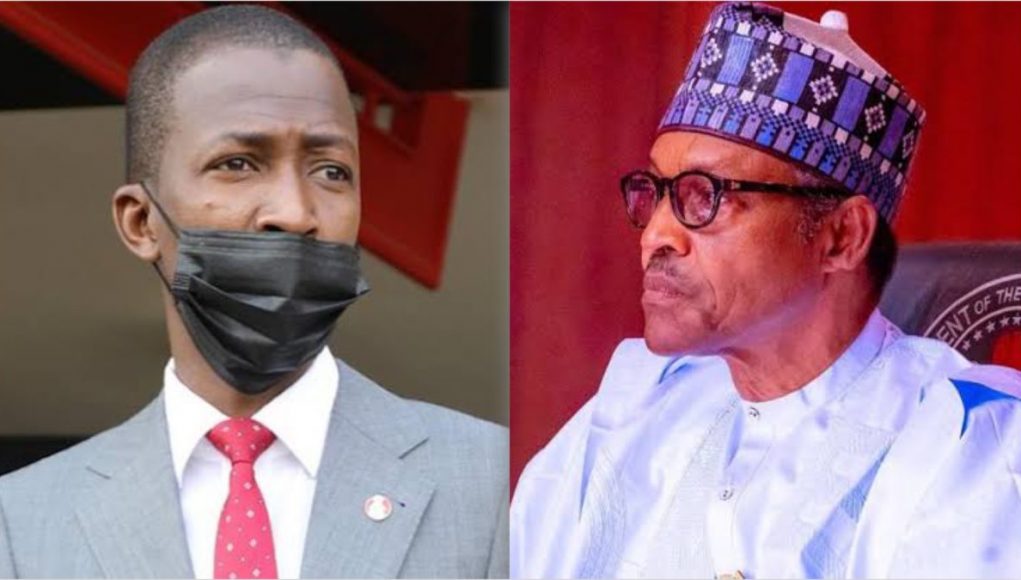
I’m wondering if I go for an interview or I’m trying to travel, and someone searches my name on the internet what they will see is my picture with all that I didn’t do,” Daniel Jonathan, a cinematographer, paraded on social media by the Economic and Financial Crimes Commission (EFCC) lamented to Peoples Gazette.
Mr Jonathan is just one of several Nigerian youths publicly paraded, especially before the media, for committing cyber and financial-related crimes without prosecution.
The anti-graft agency established in 2003 by former President Olusegun Obasanjo is charged with enforcing laws on money laundering and other financial crimes. EFCC has, however, in the past few years come under heavy criticism for its controversial raids of private premises and presenting suspects to the media as criminals, damaging their reputation.
In its manhunt for internet fraudsters, the EFCC has become a monstrous machine clamping down on many innocent Nigerians, damaging their reputation via ubiquitous media parade, subjecting them to public shame. While the EFCC and the police are notorious for parading innocent suspects, the Nigerian Army also does not resist the urge to join the infamy.
It is not unlikely that Governor Sanwo-Olu of Lagos, the state’s attorney general, other conscientious individuals in his administration, and the legislator were worried about the wanton disregard for the rule of law and human rights when he signed the ‘Administration of Criminal Justice Law (2021)’.
That law prohibits the media parade of suspects and protects the rights of any person that comes in contact with the justice system in the state.
Mr Jonathan mentioned at the outset, and nine others were picked up in the early hours of January 9, 2021, at his residence in the Alagbado area of Lagos for alleged involvement in internet fraud. The cinematographer told The Gazette that the operatives stormed his apartment and began asking questions as well as checking his phone and laptop for incriminating materials. They were taken into custody and lured into writing a statement he initially declined to write, even after they threatened to lock him up in a cell. He eventually wrote the statement because they vowed to allow him and others to reach out to their lawyers.
“They refused to let us call our family members or lawyer. One of them came to threaten me that if I didn’t write the statement that they’d lock me up. I asked how they’d make me write a statement without my lawyer. So, they said they’d let us go after writing the statement,” said Mr Jonathan.
But, he succumbed to the EFCC operatives’ pressure. After writing, I was hoping they’d allow us to call, but it was a lie. They took us to the cell and locked us up,” added the cinematographer. After their pictures were taken, Mr Jonathan lamented that they were still in the cell on the third day, when “I saw myself on Channels, they were already saying we’re cyber fraudsters.”
In a tweet on September 20, 2020, the EFCC claimed that suspects are only paraded when incriminating evidence is found against suspects.
“Kindly note that the EFCC only parades suspects after they have been profiled with evidence gotten from investigations,” EFCC had tweeted.
This followed a Twitter user, @SeunLawal’s post saying that “one of the main reasons why this commission has to change the modus of parading everyone as a suspect. No mention in the media of those cleared to counter the display of the paraded suspects.”
After regaining their freedom without the EFCC finding evidence against them, the innocent Nigerians have to endure trauma and public ignominy. EFCC’s parading of suspects on social media negates section 36 (5) of the Nigerian 1999 Constitution that protects the right of a suspect, noting that a person charged with a crime “shall be presumed innocent until proven guilty.”
Despite Mr Jonathan’s cooperation with the anti-corruption agency, he spent five days in EFCC’s detention. His phone was seized for more than a month. “It was not a funny experience,” he said. As much as he would have let the matter be taken up, “my lawyer asked that we let the matter go.”
He added, “It’s sad that my picture and that of my cousin are right there on the internet,” he reiterated. They released me when they didn’t find evidence against me. My cousin was released on the sixth day. Others who were my neighbours were charged to court. Some paid some money, and I think it’s only one of them that was sent to jail.”
A 2013 National Crime Victimisation and Safety survey conducted by the CLEEN Foundation in collaboration with the Macarthur Foundation identified EFCC as a top government agency embroiled in bribery and corruption.
Another victim who spoke to The Gazette on the condition of anonymity for fear of “further trouble” was arrested on April 15, this year in Abule Egba. EFCC operatives arrested him alongside others, including the owner of Glass House, a club in the area. EFCC had said the arrest followed “credible intelligence gathered about their alleged involvement in computer-related fraud.”
“On April 15, I was chilling with my friends at Glass House Hotel in Abule-Egba. Suddenly, we saw people running, and the whole place was in chaos. EFCC people entered and started arresting almost everybody,” he told The Gazette. He and a few others did not run. “Four of the guys I went with, and I were arrested. Our phones were collected, and we were taken to the Ikoyi office, where they told us to fill a form with our names, and they took our pictures. We were put in a cell with over 15 others.”
Continuing, he stated, “The following day, they brought us out again and started asking questions. They asked me many questions, and I answered them. They returned me to my cell. Three days after, they called me and told me to go. They returned my phone and everything. Then I was released.”
He further mentioned that although he was released, he feels terrible that his photo was displayed on the internet as a Yahoo boy.
“When I got outside, it was then I saw my pictures online as a Yahoo boy. They released me because they didn’t see anything on my phone. I feel bad because if I am going and I see people looking at me, my mind goes to my picture, and I think they probably saw my picture on the internet. I can’t walk freely again,” he said. “Sometimes, I just want to stay home and not go anywhere.”
Despite increasing criticisms by rights activists and civil society organisations against media parades of suspects, EFCC and other security agencies have made a pastime of publicly parading so-called suspects. In 2019, human rights activist Femi Falana sued the EFCC and Nigeria’s attorney general Abubakar Malami over the media parade of suspects.
Mr Falana sought “a declaration that the pre-trial media parade of criminal suspects by the Respondents is illegal, null and void as it violates Section 34 of the Constitution of the Federal Republic of Nigeria, 1999 as amended and Article 5 of the African Charter on Human and Peoples’ Rights (Ratification and Enforcement) Act (CAP A9) Laws of the Federation of Nigeria, 2004.”
In his submission, a Nigerian lawyer, Malachy Odo, described EFCC’s action as “a shame and a serious crime” that needs to be urgently addressed.
“Our constitution provides that every suspect is presumed innocent until proven guilty. So when EFCC parade arrested suspects before the media, it negates the Constitutional provision on the presumption of their Innocence,” Mr Odo explained. “Unfortunately, some persons who have been illegally paraded by EFCC turned out to be innocent of the crimes they were allegedly arrested and paraded for. Such persons owe it to themselves and the society to speak out and sue the EFCC. Our courts would be too glad to award damages in their favour and also direct the agency to issue a public apology to the affected person.”
Citing the mental torture and defamation that victims have faced, Mr Odo noted that “our courts have also held that it is illegal to parade suspects.”
He further noted that “the Lagos state government passed an Administration of Criminal Justice Law wherein parade of suspects was barred.” Despite that, he pointed out, EFCC and other law enforcement agencies “do not seem to be deterred as they wrongly assume that parading of suspects is one of the important ways to show Nigerians that they’re working.”
The spokesperson for the anti-corruption commission, Wilson Uwujaren, insisted EFCC’s parade of suspects as if they are criminals is legal and meets “global standard.”
“There is a difference between profiling and parade of suspects. I am sure EFCC has never invited Peoples Gazette or other media organisations to a parade of suspects. But it is standard law enforcement practice to profile suspects of a crime,” he explained. “Section 15 of the Administration of Criminal Justice Act empowers the commission to record details of suspects including full name, occupation, offence, occupation, address, and for the purpose of identification: his height, photograph, full fingerprint impressions, etc. This is standard procedure globally.”
He, however, did not respond to further questions regarding the reputation of those who were found innocent.
The U.S. in its ‘2020 Country Reports on Human Rights Practices: Nigeria.’ accused the EFCC of only probing “low- and mid-level government officials.”
“The bulk of ICPC and EFCC anti-corruption efforts remained focused on low- and mid-level government officials,” but delay procedures in cases of high-level officials indicted for financial crimes,” it stated. “In 2019, both organisations started investigations into and brought indictments against various active and former high-level government officials. Many of the corruption cases, particularly the high-profile ones, remained pending before the court due to administrative or procedural delays.”
The commission dismissed the findings in a statement by Mr Uwujaren, who said the commission would not fold its arms while its integrity was being “toiled” with.
“The commission considers its integrity as a core value and has toiled relentlessly to sustain its reputation as an effective law enforcement organisation with zero tolerance for corruption,” the agency claimed. “It will therefore not fold its hand while some armchair researchers desperate to justify a grant use the result of a spurious survey to cast aspersion on its integrity.”
Yet, EFCC has continued to gain notoriety for gross violations of human rights, breaking into private homes and hotels, brutalising and sometimes groping women. Since the assumption of EFCC’s chairman Abdulrasheed Bawa, the anti-graft operatives’ gung-ho style now borders on gangsterism and vindictiveness. Worried about its extrajudicial operations, the nation’s Allied Political Parties for Good Governance appealed to President Muhammadu Buhari to rein in Mr Bawa and his goons.


















































